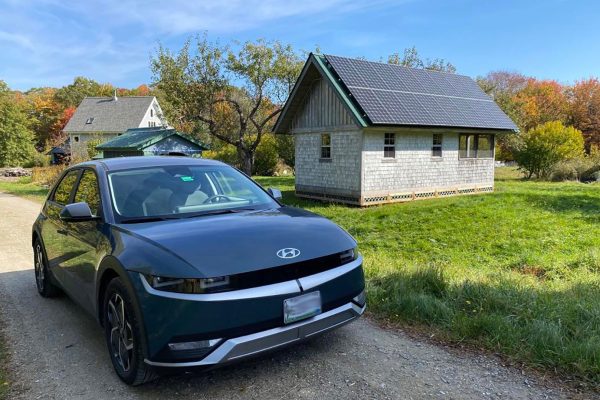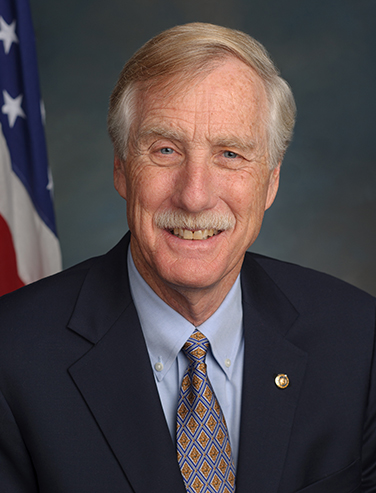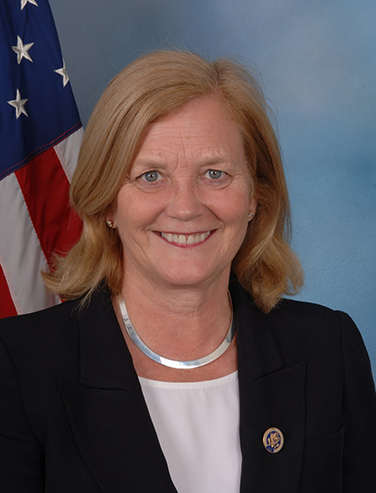EPA's Administrator announced a proposal to undo 31 science-based rules that were put in place to protect our health, waters, and wildlife. He also said he wants to reduce EPA's budget by 65%. Join us in sending a message to Maine's Congressional delegation, urging them to stand up against these rollbacks and defend EPA's mission to protect public health and our environment.
Decisions made in Washington, D.C., have lasting effects on Maine’s clean air and water, our thriving forests and wildlife, and on the health of Maine people, our economy, and our way of life.
The Natural Resources Council of Maine works closely with Maine’s Congressional delegation to advance legislation and policies that will accelerate a clean energy future, expand access to the outdoors, and protect our nation’s wildlife.
In the last few years, NRCM mobilized our supporters to help pass the most significant climate action in U.S. history, secure bipartisan funding for infrastructure, and conserve new public lands. These investments in our future are already benefiting communities and people across the state.

Senator Collins Must Vote No on Reconciliation Bill
June 30, 2025 (Augusta, ME) — Maine’s leading nonprofit, nonpartisan membership organization dedicated to protecting the environment, the Natural Resources Council of Maine (NRCM), today called on Senator Susan Collins to vote against a massive bill that seeks to kill the growing domestic clean energy industry and underfund America’s public lands—programs that are of great Read More

Update: Pressure Rises in Maine to Oppose Cutbacks in Reconciliation Bill
The U.S. Senate is expected to vote soon on the reconciliation budget bill that would increase the national debt by trillions and give billionaires tax breaks while increasing costs for working families. Pressure is ramping up on Senator Susan Collins to oppose the most drastic environmental rollbacks in the bill and join her Republican colleagues Read More

Here’s How the Reconciliation Bill is Harmful to Maine
You may have heard some rumblings in the news about a “Big, Beautiful Bill” (H.R. 1) that is making its way through Congress right now, but it’s actually pretty ugly. The proposals being led by Congressional Republicans aim to make billionaires richer by slashing programs that serve working people, all while increasing the national debt Read More

Mainers Would Face Higher Costs, Job Creation Would Slow Under US House Energy Plan
May 13, 2025 (Augusta, ME) – Homeowners and businesses in Maine would miss out on valuable cost-savings and jobs in one of the state’s fastest growing sectors would slow under the U.S. House of Representative’s energy budget proposals released over the past few days. The plans are part of a reconciliation package being debated by Read More

Assessing the Trump Administration’s First 100 Days
It’s not right to pull funding out from under the feet of hard-working farmers and foresters. It’s not right to endanger public safety and undermine the success of our fishing families by cutting staff and research at NOAA. It’s not right to fire hundreds of scientists who are using the best research available to assess Read More

Proposal to Open Up Maine’s Ocean Waters to Oil and Gas Drilling Defies Explanation
April 30, 2025 (Augusta, ME) – The Trump Administration has announced a program that could allow offshore oil and gas drilling off the coast of Maine, prompting opposition from one of the state’s leading environmental groups. In an April 29 announcement, the Bureau of Ocean Energy Management said it will open up public comment on Read More

Federal Clean Energy Rollbacks Could Raise Maine Electricity Costs
Here’s how the Trump Administration’s attacks on American-made clean energy will make electricity in Maine more expensive and less reliable: There are a lot of actions on energy and the environment being taken by the Trump Administration these days, many of which will have real consequences for Maine people, local businesses, and our communities. Here, Read More

ISO-NE CEO Reiterates Offshore Wind Essential for Future Grid Reliability
March 25, 2025 (Washington, D.C.) — In prepared remarks to be delivered to Congress today, the head of the Independent System Operator of New England, (ISO-NE), the independent group responsible for managing the region’s electric grid and wholesale energy markets, reiterates the importance of developing offshore wind projects for future grid reliability. The appearance by Read More

Mainers Speak Out Against Chaotic Federal Funding and Firing Decisions
News release March 19, 2025 (Brewer, ME) ━ One by one, a diverse group of Mainers including a fired federal worker, business and fishing groups, a veteran, and a SNAP participant spoke about the real-world harm that has been inflicted by the chaotic decision-making of the Trump Administration. Ocean Crawford, a mother of three from Read More

Senator Susan Collins
413 Dirksen Senate Office Building
Washington, DC 20510
(202) 224-2523
Email Senator Collins
Augusta: (207) 622-8414
Bangor: (207) 945-0417
Biddeford: (207) 283-1101
Caribou: (207) 493-7873
Lewiston: (207) 784-6969
Portland: (207) 618-5560

Senator Angus King
133 Hart Senate Office Building
Washington, DC 20510
(202) 224-5344
Email Senator King
Augusta: (207) 622-8292
Bangor: (207) 945-8000
Biddeford: (207) 352-5216
Portland: (207) 245-1565
Presque Isle: (207) 764-5124

Congresswoman Chellie Pingree
2162 Rayburn House Office Building
Washington, DC 20515
(202) 225-6116
Email Congresswoman Pingree
Portland: (207) 774-5019
Waterville: (207) 873-5713

Congressman Jared Golden
1223 Longworth House Office Building
Washington, DC 20515
(202) 225-6306
Email Congressman Golden
Bangor office: (207) 249-7400
Caribou office: (207) 492-6009
Lewiston office: (207) 241-6767
Federal Climate & Clean Energy Issues
Bold Climate Action
From our lakeshores to the ocean coastline, the impacts of climate change are already being felt in Maine’s communities and the high costs of oil and gas hitting Mainers’ pocketbooks.
We all value our connection to community and Maine’s natural environment. To stay strong and well prepared for the future, we need to act quickly and boldly on climate.
NRCM partners with Mainers, businesses, and other local organizations to push Congress and the federal government to take ambitious climate action that will create millions of new jobs, deliver home-grown clean energy to power our future, and protect our health.
Working together with our supporters, NRCM has successfully advocated for the largest investment in climate in U.S. history and billions in infrastructure funding to make our communities more resilient. Moving forward, we will continue to hold Congress accountable to their responsibility to accelerate the transition to clean energy to avert the worst impacts of climate change.
The release of Maine’s Climate Action Plan in December 2020 (with an updated Plan released in November 2024) laid out a positive path forward for tackling climate change and growing our economy. Continued federal action on climate will give Maine’s communities the tools and resources they need to advance cost-effective clean energy solutions.
Climate Change and Its Effects on Maine
Maine’s communities are especially vulnerable to the effects of climate change because of our close relationship with the natural environment.
Our coastal communities—vital to our tourism economy—are threatened by increasingly severe storms and sea-level rise while our lakes are seeing increasingly warmer waters.
Extreme weather is straining our public emergency responses and infrastructure.
Learn How Climate Change Impacts:
Federal Water, Land, & Wildlife Issues
Protecting Wildlife
Each species has an important ecological role to play in the web of life. Globally, one million species are at risk of extinction due to climate change, pollution, habitat loss, invasive species, and exploitation.
One tool that has and can continue to help address this biodiversity crisis is the U.S. Endangered Species Act (ESA). The ESA, signed into law in 1972, has been incredibly successful at protecting species in Maine and across the nation from the brink of extinction.
NRCM is working with national environmental groups to support adequate funding for the ESA and additional funding for wildlife protection through proposals like the Recovering America’s Wildlife Act.
Clean Water
Federal Clean Water Act
NRCM created a badge for organizations to use free of charge to celebrate the Clean Water Act 50th anniversary in 2022.
Clean, healthy waterways are vital to our day-to-day lives, central to our identity, and integral to our future. More than 50 years ago, the magnitude of pollution in the Androscoggin and other Maine rivers reached a tipping point, helping to galvanize passage of the Clean Water Act on October 18, 1972.
Maine's U.S. Senator Edmund Muskie played the critical role in writing and securing passage of this landmark legislation for the nation. In the years since, thanks to the incredible work of countless individuals, organizations, and businesses, Maine’s rivers, lakes, streams, and coastal waters have achieved remarkable progress, which deserves celebration. But we still have additional work to do to ensure clean water for future generations.
In 2022, NRCM joined with partners across Maine to create a statewide celebration of the 50th anniversary of the Clean Water Act that focused on the importance of clean water, strong environmental laws, investment in clean water infrastructure, and committing to continued progress. At a celebration in Lewiston on September 29, 2022, we celebrated 100 Clean Water Champions. Read full remarks by NRCM Advocacy Director Pete Didisheim.
Conserving Land
NRCM and our partners helped pass the Great American Outdoors Act, providing permanent funding for the popular and effective Land and Water Conservation Fund (LWCF). The bill, which was championed by every member of Maine’s Congressional delegation, also provided sorely needed funding to invest in maintenance and upkeep of popular national parks and public lands.
Fully funding LCWF will result in much-needed land conservation, public access improvements, local industry support, and the creation of more outdoor spaces that benefit us all and contribute to a vibrant economy.












